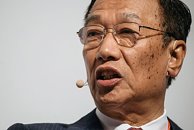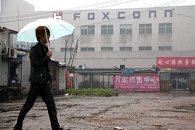Friday, June 23rd 2017

Foxconn Eyeing US for $10 billion Investment; Looking After Toshiba Deal
Taiwan-based Foxconn, one of Apple's main suppliers, is looking to expand its operations in the US to the tune of $10 billion. The company is still deciding which state will get the greatest solo investment, in the form of a $7 billion display factory (worth mentioning here is that Foxconn's display manufacturing has seen a recent buff by the acquisition of Sharp.) Reportedly, investments are being considered in Ohio, Pennsylvania, Michigan, Illinois, Wisconsin, Indiana, and/or Texas. There was no given timeframe for the construction's start or finish, but a final decision should be made public in July. Foxconn's CEO Terry Gou also vowed to press on with a bid for Toshiba Corp.'s semiconductor business, although the Japanese company has already selected a preferred buyer in the form of a Japanese and US joint venture. Such a deal could cost $27 billion and introduce Foxconn (and, likely but indirectly, China) into the memory chip business."Our investment in the U.S. will focus on these states because they are the heart of the country's manufacturing sector," Terry Gou told investors. "We are bringing the entire industrial chain back to the traditional manufacturing region of the U.S. That may include display making, semiconductor packaging and cloud-related technologies," Gou told reporters later, without elaborating. If such a venture succeeds, that spells great news for the US economy and employment opportunities, even though Foxconn has been investing in the development of a more automated production environment, in a bid to cut workforce costs. One thing is certain: whichever the state that ends up being chosen will see tremendous value added to its economy. Remember, where a big investment lands, other satellite investments soon follow, be it in infrastructure or other areas.
Sources:
Bloomberg, Apple Insider


27 Comments on Foxconn Eyeing US for $10 billion Investment; Looking After Toshiba Deal
They guy has clearly lost his mind, as there's no way Japan is going to allow him to take control over Toshiba's semiconductor business. He might be able to do it with some kind of joint venture with Japanese partners that will own at least 50% of the company, but that's not something he's going to want to do.
Insurance would go through the roof in the States.
There has been talk of some huge factory possibly being built where I live...
They were looking at a property where the world's 3rd largest steel mill used to sit on a 1000 acre lot... that and this area has an abundance of skilled manufacturing workers looking for a job.
I've also noticed an increase of Chinese business professionals taking tours of where I work... Seriously hoping someone buys this place.
reason.com/blog/2017/03/15/government-picks-a-cleantech-loser-again
reason.com/archives/2016/04/28/elon-musk-crony-capitalist
reason.com/blog/2017/05/12/another-solar-boondoggle-goes-belly-up
Companies around the world are refraining from putting all their eggs in one basket because slips in supply is as bad as slips in demand (lose buyers).
Let's also not forget that states will give crazy incentives to snag a large manufacturer setting up shop in their borders.
If you like the idea of restricting businesses, maybe go live in one of those communist countries. I heard the weather is really good there.Don't be a douche.
Just let things run and work on their own merit...is that too much to ask?
Oh, and Trumps record as a business man is a pretty sad joke.
So kinda, yeah.
One thing is receiving money another is expanding on it.
I could go dig up more facts on his various near bankruptcies too, but I'd rather not continue this line of discussion honestly. Some google-fu can confirm what I stated.
Not sure how that is even a sad joke or even a saving account would have benefited better. The majority of people in the world do far worse with their money.
Middle-East learned, payed dearly and are still feeling the after effects of screwing with oil supply pricing. Gas prices tanked, demand went down as alternative fuel renewables gained traction, while demand was still strong many smaller players opened up shop to fill the void in supply created by the middle-east, as a result preventing them from simply opening up the taps again. Also forgot China is fiercely cutting back as it tries to fight pollution. With demand down, and markets oversaturated there is a large glut of fuel on the market.
Middle East can't really cut back anymore on fuel production unless their plan is to slowly exit.